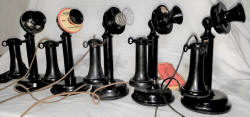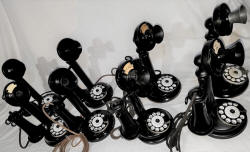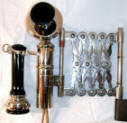|
 



| There are a lot of images on
these pages, please be patient when downloading. |
|
I invite you to click on the small
picture to see a larger version.
These photographs are not to scale
| c.1903-1912 - With earlier style #25
inside terminal receiver. Third picture shows inside
base view. |
|
|
c.1903-1912 - NOTE: Only
differences of these manual sticks is the inside base as
shown. Any information regarding reasoning of the wiring
deviation, please contact me. |
|
|

Keystone Manuals |
|

A Team
of Keystones |
|
Keystone Telephone Company of Philadelphia
Dial Desk Stand |
|
c.1911-1923 - I display this deskstand
mainly because it was found with a great earlier style
Mercedes dial equipped with an original very early number
face made from thick paper material rather than the familiar
porcelain. The paper has held up surprisingly well for its
age.
Additionally, the fingerwheel is stamped "AUTO. ELEC. PAT.
597062 U.S.A." |
I have found 3 styles of dial sticks,
having just subtle differences to do with a ring/band
located at the bottom edge of the switch-hook cutout.
The purpose of the ring is likely for reinforcement.
With each change, there are differences to the pileup
inside as well, the earliest being much more primitive
than the last.
What appears to be the most common and
likely the last produced is just a straight shaft with
no ring (left). Likely an earlier style having a ring
stamped into the shaft which is possible the rarest
(center). Finally, the earliest style having a steel
band attached to the outside of the shaft (right). Very
similar to the much earlier manual Phila model 43.
|
For
comparison, I added the above pictures of an all
original, early Automatic Electric dial (same as on the
stick to left). They have the same paper dial face,
though this one is complete with the original protective glass
covering. Also, this one has the original number card
and "+" shaped retainer. Likely, this number card and
retainer was used on #50 coin collectors.
When used with Keystone phones, the number card/retainer
would be replaced by Keystone's distinctive porcelain
disc. These earlier "Mercedes" type dials are difficult
to find, especially with the original glass still
intact.
|
|
Keystone Telephone Co. of Philadelphia
Adjustable Telephone |
 |
 |
|
c.1903 - 1906
- This
Burns Adjustable Telephone (or Burns Bracket Scissor Gate)
for use on Flat or Roll Top Desks was offered in the Central
Energy Telephone, American Electric Telephone Co. Bulletin
No. 20. Although the bulletin is not dated, it appears from
other documentation this phone was offered in 1903 - 1906,
possibly as early as 1902.
According to the bulletin, the
model with circuit #101 was produced specific for Keystone. The model pictured here has
KEYSTONE TELEPHONE CO PHILADELPHIA PAT APLD. FOR stamped
into the transmitter backcup. On the scissor arm is stamped
AMELEC.TEL.CO. MANFRS. CHICAGO PAT.APLD.FOR. The "American Beauty"
transmitter is unmarked and has no number tag. Additionally, there are two
different perches used on both the #43 Philadelphia Type
(above) and this model. Equipped with an extremely rare
American Electric #26 brass bottomed receiver. NOTE: This Adjustable Phone,
as well as the #26 and the #25 receivers are all displayed
in the same American Electric Bulletin. (The #25 receiver is
pictured on the manual phone below.) |
|
Dial Desk Stand with Number Card Holder |
|
Keystone Lineman/Repairman Test Set |
| c. 1913ish - Here is an example of a very different Keystone
Lineman/Repairman Test Set. Usually, these type sets are not highly
collectable, but I am partial to anything Keystone. It seems
a bit primitive, and interesting the watch case style
receiver is manufactured by Kellogg, yet has a Keystone
marked cap on the transmitter. Although the Keystone cap
looks identical to (and could be) a Keystone receiver cap,
the cap threads will not fit any of my Keystone receivers. Although in fair condition, obviously this set saw
some hard usage. |

Phonemandave - Page 2 Keystone Telephone Co. Philadelphia
|
